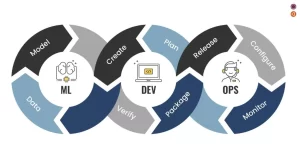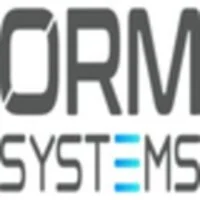
The Role of MLOps in Modern Machine Learning:
In the dynamic realm of technology, the quest to harness the full potential of artificial intelligence (AI) and machine learning (ML) is more pressing than ever for organizations aiming to secure a competitive advantage. Transitioning ML models from the drawing board to real-world applications, however, presents a myriad of challenges. Machine Learning Operations (MLOps) emerges as a beacon, offering a structured methodology that seamlessly connects ML model development with their operational deployment. This exploration into MLOps unveils its significance in amplifying operational efficiency and automating the intricate processes inherent in machine learning.
MLOps Ascendant:
MLOps has rapidly evolved as a pivotal response to the growing necessity for agile, scalable ML model deployment. With ML adoption surging across industries, the demand for an effective framework to manage these models’ lifecycles has become apparent. Drawing inspiration from DevOps, MLOps aims to foster a collaborative environment between data scientists and operational teams, thereby accelerating the delivery and enhancement of ML-driven innovations.

Foundational Elements of MLOps:
Seamless Integration and Deployment:
Echoing the principles of DevOps, MLOps champions CI/CD practices within the ML sphere, enabling the automated integration of updates and consistent model performance throughout various phases.
Comprehensive Version Control:
The emphasis on stringent version control of both code and data within MLOps is crucial for effective change tracking, dependency management, and rollback capabilities.
Rigorous Model Testing:
MLOps mandates exhaustive testing to verify model accuracy, efficacy, and consistency, ensuring dependable performance across diverse environments.
Dedicated Monitoring and Refinement:
Post-deployment, it’s imperative to continuously monitor models for any performance dips or data anomalies, with MLOps offering strategies for timely adjustments and data realignment.
Advancing MLOps Practices:
MLOps is not static; it’s an ever-evolving domain, incorporating sophisticated methodologies that enhance ML model maturation and deployment. Innovations in automated retraining and progressive deployment techniques ensure models stay current and responsive, aligning with ongoing data and environmental shifts, thereby bolstering organizational agility.
Exploring MLOps Ecosystems and Toolsets:
As the MLOps field matures, its ecosystem expands, bringing forth a plethora of tools and platforms designed to streamline various stages of the ML lifecycle. These tools, ranging from data versioning utilities to model monitoring frameworks, play a pivotal role in operationalizing the principles of MLOps. They provide the technical scaffolding necessary to implement the continuous integration, delivery, and deployment of ML models, thus embodying the essence of MLOps in practical terms.

Data Versioning and Experiment Tracking:
An integral component of MLOps is managing and versioning not just the code but also the data and experiments. Tools like DVC (Data Version Control) and MLflow enable teams to maintain a comprehensive history of their datasets, model parameters, and experiment results, facilitating reproducibility and transparency. This level of detailed tracking is indispensable for debugging models, iterating on experiments, and sharing findings within the organization.
Model Deployment and Serving:
Deploying and serving models efficiently is another crucial aspect of MLOps. Platforms like TensorFlow Serving, TorchServe, and Kubernetes provide robust environments to deploy, scale, and manage ML models in production. These tools ensure that models are readily accessible and performant, catering to the needs of end-users and applications that rely on real-time ML insights.
Continuous Monitoring and Model Governance:
Once an ML model is deployed, continuous monitoring is essential to detect and address any issues related to model performance or data drift. MLOps introduces mechanisms for monitoring model health, user feedback, and operational metrics, ensuring that any degradation is swiftly identified and rectified. Additionally, model governance frameworks help in documenting model lineage, ensuring compliance with regulatory requirements, and facilitating model audits.
The Role of MLOps in Democratizing AI:
MLOps not only streamlines operations but also plays a crucial role in democratizing AI. By standardizing ML workflows and making advanced ML capabilities more accessible across the organization, MLOps enables a broader range of professionals to contribute to and benefit from AI initiatives. This democratization fosters a culture of innovation, where diverse teams can collaborate on AI projects, exchange insights, and drive the organization forward.
MLOps as a Catalyst for AI Transformation:
In the grand scheme of technological evolution, MLOps is more than just a set of practices; it’s a catalyst for AI transformation. It empowers organizations to harness the full potential of AI and ML, transforming these technologies from experimental tools into core drivers of business value. As organizations navigate the complexities of the digital age, MLOps provides the methodologies, toolsets, and cultural paradigms necessary to thrive in an AI-centric world.
Cloud Synergies with MLOps:
MLOps’ integration with cloud computing is a game-changer, providing scalable and flexible infrastructures ideal for ML workflow management. This integration empowers organizations to harness robust cloud resources and MLOps tools to refine model training, deployment, and collaboration, propelling operational innovation and competitive edge.
Collaboration and Ethics at the Core of MLOps:
MLOps cultivates interdisciplinary partnerships, bridging the divide between varied experts to align ML models with broader organizational aims. It underscores ethical AI, instilling frameworks for fairness, transparency, and accountability, which are essential as ML models increasingly impact society.
AI Meets MLOps: The Path Ahead:
The intertwining of AI advancements with MLOps foretells a transformative future. As AI grows in complexity, MLOps will be vital in ensuring these sophisticated models are efficiently deployed, governed, and scaled, heralding a new wave of technological and industry-specific breakthroughs.
Operational Excellence through MLOps:
MLOps is more than a methodology; it’s a strategic imperative that enhances team synergy, automates routine tasks, and guarantees scalability. Its application spans sectors, optimizing financial models, healthcare diagnostics, and retail analytics, promising enhanced strategies and consumer experiences.

Challenges and Forward Momentum:
Despite its benefits, MLOps faces hurdles like complex data workflows and privacy concerns. Yet, the future looks promising, with potential enhancements in automation and governance poised to solidify MLOps’ foundational role in ML’s future.
Conclusion:
Machine Learning Operations (MLOps) represents a critical evolution in the field of machine learning, facilitating a more integrated, efficient, and ethical approach to ML deployment and management. As organizations embrace MLOps, they unlock the capability to expedite innovation, ensuring that their machine learning endeavors are not only successful but also sustainable and aligned with future technological advancements. Embracing MLOps is not just about enhancing current practices; it’s about setting a course for enduring success in the AI-driven landscape











